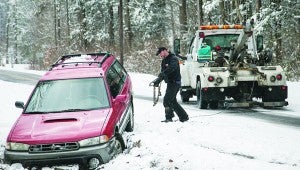Calls for tow trucks more than double when roads are slick
Published 9:08 am Monday, March 2, 2015
When the snow starts to fall, the cars start to slide.
After the car meets the ditch, it usually means a tow truck must rescue the driver from the snowy roadside.
Local wrecker services reported seeing business at least double in the past two weeks as storm after storm pounded the county with frigid temperatures, ice and snow.
Meredith Brothers Collision had a 60 percent increase in business, owner Jamie Hardin said.
“We have answered 149 calls since the snow started,” Hardin said Thursday afternoon. “There have been days where I have been in the truck for 17 hours. It’s been a little crazy.”
T & E Towing Co. in Hampton also found itself busier since the snow came to town.
“Because there has been ice under the snow, it has been more treacherous, so we have been getting more calls,” Julie Guinn said. “We’ve gotten so many calls, I have lost track of them all, so it’s been quite a few.”
While tow truck drivers are used to seeing an array of cars slid into ditches, guardrails and down banks, there are some calls that leave drivers wondering exactly how the car ended up where it did.
Hardin last week was asked to remove a large pickup truck from an in-ground pool in Bristol.
“All the way over there, I was wondering how it happened, but when I saw, it I understood,” he said. “The house had an in-ground pool behind it. It didn’t have a fence around it, and it had one of those tough covers so it didn’t sag under the snow. The guy thought he was pulling into a parking spot behind the house because it looked like part of the driveway.”
Not every call proves to be that unusual, but drivers do answer an abundance of calls during the snow.
Hardin was called out to the double bridges between Hampton and Valley Forge, Highway 321 around Watauga Lake and the back roads of Stoney Creek most often. T & E Towing fields a lot of calls from Roan Mountain and Hampton area, Guinn said. C & K Towing had more calls from Siam, Garrison Hollow and Charity Hill Road for this storm, owner Wes Johnson said. Last week, the calls seemed to come more from the Central community for C & K.
“It’s odd the way it works sometimes,” Johnson said. “There are areas that you won’t see for a while, and then you will get three or four calls in a row to go there.”
Tow truck drivers are used to going out in the bad weather to help out stranded motorists. Experience and the right equipment can help them travel in conditions that might be riskier for average drivers.
“Knowing how to drive in the snow comes with time,” said Guinn, whose husband Eddie drives a wrecker. “We have been driving in this for years because we grew up here. Truthfully, my husband has a God-given gift for it, and is really good at what he does.”
All the companies agreed having good tires, chains for the tires and the right equipment; such as shovels, oil-dry for traction and the proper clothing, were very helpful in getting the job done right. However, there are some calls that even tow drivers have to turn down.
“We’re cautious,” Johnson said. “There are some calls we can’t take until the next day when conditions improve. Sometimes it is easier to get the car out by hand, by putting our chains on their car and using our equipment to get it out because the wrecker can’t get in to get it.”
If drivers need to get out in the snow and ice, a little preparation goes a long way, Guinn said. She suggested drivers should try to find out about conditions before heading out on the roads, and should check to make sure their vehicles are working correctly before leaving.
“The biggest thing we find is people not being prepared,” she said. “There are people out joyriding to see what they can see, and then they get somewhere they can’t get out of. They will go up to the top of Unaka Mountain, or Roan Mountain, and then find out their 4-wheel drive doesn’t work. Another thing is finding out there is more snow than they thought.
Perhaps the biggest safety tip for winter traveling is to stay home unless it is necessary to be out.
“Stay home if you can,” Hardin said. “If you have to go out, don’t brake hard, don’t accelerate fast and don’t go too fast.”






